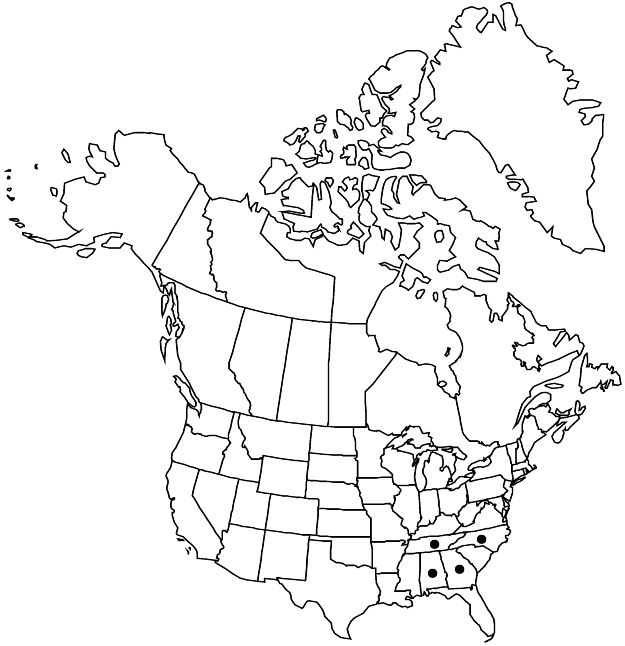Difference between revisions of "Crataegus brittonii"
Bull. Torrey Bot. Club 36: 640. 1909.
FNA>Volume Importer |
FNA>Volume Importer |
||
| Line 35: | Line 35: | ||
|distribution=Ala.;Ga.;N.C.;Tenn. | |distribution=Ala.;Ga.;N.C.;Tenn. | ||
|discussion=<p>Of conservation concern.</p><!-- | |discussion=<p>Of conservation concern.</p><!-- | ||
| − | --><p>Crataegus brittonii is a rare species with a scattered distribution.</p><!-- | + | --><p><i>Crataegus brittonii</i> is a rare species with a scattered distribution.</p><!-- |
| − | --><p>For a discussion of the possibly synonymous but untypified pink-anthered Crataegus rhodella Ashe and C. arenicola Ashe see J. B. Phipps and K. A. Dvorsky (2006).</p> | + | --><p>For a discussion of the possibly synonymous but untypified pink-anthered <i>Crataegus</i> rhodella Ashe and <i>C. arenicola</i> Ashe see J. B. Phipps and K. A. Dvorsky (2006).</p> |
|tables= | |tables= | ||
|references= | |references= | ||
| Line 60: | Line 60: | ||
|publication year=1909 | |publication year=1909 | ||
|special status=Conservation concern;Endemic | |special status=Conservation concern;Endemic | ||
| − | |source xml=https://jpend@bitbucket.org/aafc-mbb/fna-data-curation.git/src/ | + | |source xml=https://jpend@bitbucket.org/aafc-mbb/fna-data-curation.git/src/8f726806613d60c220dc4493de13607dd3150896/coarse_grained_fna_xml/V9/V9_1042.xml |
|subfamily=Rosaceae subfam. Amygdaloideae | |subfamily=Rosaceae subfam. Amygdaloideae | ||
|tribe=Rosaceae tribe Gillenieae | |tribe=Rosaceae tribe Gillenieae | ||
Revision as of 18:14, 18 September 2019
Shrubs, slender, 30–40 dm. Stems: twigs: new growth pubescent, 1-year old gray-brown, ± shiny, glabrous, older gray; thorns on twigs often numerous, ± straight to slightly recurved, 1-year old blackish, ± slender, 3–5 cm. Leaves: petiole 3–6 mm, flared distally, pubescent, glandularity not recorded; blade elliptic-rhombic to broadly elliptic-rhombic, 2–3.5 cm (usually widest near middle), length/width = 1.3 or wider, base broadly cuneate, lobes 0, or 1(or 2) per side, margins crenate-serrate, teeth caducous, gland-tipped, venation ± craspedodromous, veins 3 or 4 per side, apex rounded to subacute, abaxial surface pale green, soft pubescent, indumentum variably persistent with age, adaxial dark green, appressed-pubescent. Inflorescences 2–6-flowered; branches densely pubescent; bracteoles type 2. Flowers 14–18 mm diam.; hypanthium densely pubescent; sepals foliaceous, at least as long as petals, adaxially pubescent; anthers ivory; styles 3–5. Pomes red or ruddy, sometimes becoming dull brown, 14 mm, pubescent; sepals reflexed; pyrenes 3–5.
Phenology: Flowering Apr–May; fruiting Sep–Nov.
Habitat: Brush
Elevation: 0–200 m
Distribution

Ala., Ga., N.C., Tenn.
Discussion
Of conservation concern.
Crataegus brittonii is a rare species with a scattered distribution.
For a discussion of the possibly synonymous but untypified pink-anthered Crataegus rhodella Ashe and C. arenicola Ashe see J. B. Phipps and K. A. Dvorsky (2006).
Selected References
None.